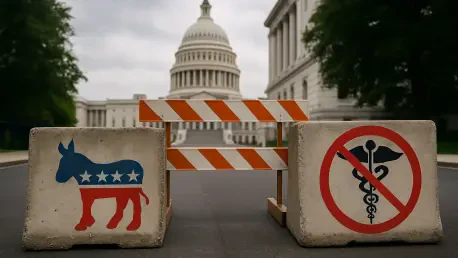The federal government is currently mired in a shutdown that has left critical services hanging in the balance, with Senate Democrats and House Republicans locked in a bitter dispute over a funding bill. This standoff, driven by sharply divergent priorities, centers on allegations that Democrats are pushing for taxpayer-funded healthcare for undocumented immigrants, a claim that has inflamed partisan tensions. Speaker Mike Johnson (R-LA) has accused Senate Minority Leader Chuck Schumer (D-NY) of rejecting a straightforward continuing resolution (CR) twice in a single day, prioritizing ideological demands over the needs of federal employees and essential programs. Meanwhile, Democrats vehemently deny these accusations, insisting their counterproposal focuses on broader healthcare access without targeting specific groups. The resulting impasse has disrupted government operations, affecting everything from disaster relief to nutrition assistance, and has sparked widespread public frustration over political gridlock.
Unpacking the Core Dispute
The heart of this conflict lies in a fundamental disagreement over a House-passed continuing resolution intended to keep the government running. Republicans, under Speaker Johnson’s leadership, have framed their proposal as a clean, nonpartisan solution devoid of contentious policy riders. However, Senate Democrats, led by Schumer, have blocked the bill, countering with a plan that Republicans claim includes provisions for healthcare benefits for undocumented immigrants. Johnson has publicly stated that Schumer demanded such a policy during high-level discussions in the Oval Office, alleging it would undo Republican reforms projected to save $185 billion by removing ineligible recipients from Medicaid. This accusation has become a lightning rod, with GOP leaders arguing that using taxpayer dollars for such purposes is fiscally irresponsible and a betrayal of American citizens’ needs, especially during a time when federal workers and military personnel risk going without pay due to the shutdown.
Beyond the immediate rhetoric, the debate reveals a deeper clash of values between the two parties. Democrats have dismissed Republican claims as baseless, with Schumer calling the assertion that their plan funds healthcare for undocumented immigrants a blatant falsehood. Their counterproposal, detailed in Section 2141 of their version of the CR, focuses on repealing recent GOP health policy changes and extending enhanced Affordable Care Act (ACA) premium tax credits. Notably, it lacks explicit language about coverage for undocumented individuals, which fuels the Democratic argument that their intent is being misrepresented. Critics, however, point to historical statements from Schumer himself, dating back decades, where he seemingly acknowledged loopholes allowing undocumented immigrants to access benefits. This contradiction has added fuel to the Republican narrative, complicating the Democratic defense and intensifying the public perception of a party at odds with its past positions.
Public and Political Fallout
The shutdown’s ripple effects are being felt across the nation, with federal employees, Border Patrol agents, and military personnel facing the prospect of missed paychecks. Essential programs like nutrition assistance for vulnerable families, telehealth services for remote communities, and disaster relief efforts are at risk of lapsing, underscoring the real-world consequences of this political stalemate. A recent poll by a major national outlet revealed that 65% of registered voters, including a significant portion of Democrats, oppose halting government operations over unmet policy demands. This widespread discontent highlights a growing frustration with partisan brinkmanship, as many Americans prioritize pragmatic governance over ideological battles. Both sides acknowledge the severity of the situation, yet each attributes the blame to the other, with Republicans labeling it the “Schumer Shutdown” and Democrats accusing the GOP of refusing to negotiate in good faith.
Adding to the complexity, the White House has aligned with Republican criticisms, describing the Democratic counterproposal as an exorbitant demand packed with partisan policies. High-ranking officials, including the Press Secretary and Vice President JD Vance, have urged an immediate reopening of the government before delving into divisive policy debates. They argue that the Democratic plan not only pushes for controversial healthcare provisions but also threatens cuts to rural hospitals, further endangering critical services. This unified Republican and White House stance has amplified the narrative that Democrats are overreaching, holding the government hostage to demands that lack broad public support. As the deadlock persists, the pressure mounts on both parties to find a resolution, though neither appears willing to compromise on core issues—healthcare policy for Democrats and fiscal restraint for Republicans—leaving the path forward uncertain.
Navigating the Path to Resolution
Reflecting on the events that unfolded, the federal shutdown emerged as a stark illustration of how deeply polarized healthcare and funding priorities can fracture governance. Democrats and Republicans traded accusations, with the GOP’s framing of Democratic demands as support for undocumented immigrants clashing against Schumer’s firm denials. The public, caught in the crossfire, expressed clear frustration through polls that condemned the disruption of essential services for the sake of political posturing. Looking ahead, breaking this impasse will require a willingness to prioritize dialogue over division, potentially through a stripped-down funding bill that sidesteps contentious policy riders. Lawmakers on both sides must also heed the public’s call for accountability, ensuring that federal workers and vulnerable populations are not left bearing the cost of inaction. A renewed focus on bipartisan negotiation could serve as the foundation for restoring government operations and addressing underlying policy disputes in a more constructive forum.









